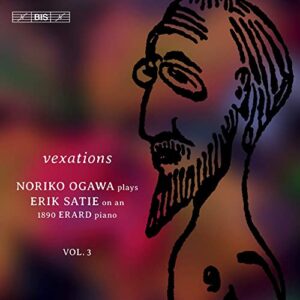Erik Satie’s strange piano piece Vexations probably dates from around 1893 or 1894. It begins with a slowly moving 18-note theme. Then the theme repeats, this time harmonized in the right hand by two voices moving mostly in parallel tritones. Following a second statement of the single-line theme, the tritone harmonization is then inverted. Simple as that, except that Satie asks you to play Vexations 840 times. Actually, it’s more of a suggestion than an imperative. Satie’s inscription (in French) translates: “In order to play the theme 840 times in succession, it would be advisable to prepare oneself beforehand, and in the deepest silence, by serious immobilities.” In any event, Noriko Ogawa spares us 840 repetitions, opting instead for a mere 142.
She first plays the piece as I described. Her subsequent repetitions include both harmonizations but not the single line iterations. For the final repetition, she returns to the aforementioned single line/harmonization/single line/harmonization template, adding a final single line to conclude. Ogawa’s basic tempo is faster than what Satie’s Tres lent suggests. She adheres to her tempo throughout, yet achieves variety through dynamic variation, contrasted articulations, shifts in voicing, and the like. In addition, Ogawa plays an 1890 vintage Erard piano, giving us the first extended recording of Vexations on a period instrument. Seriously!
Whether this endeavor proves mesmerizing or pointless is not for me to say, except that if you want the single line/harmonization game plan throughout, Stephane Ginsburgh’s recording of 42 repetitions is relatively easy to source. For all 840 repetitions, Jeroen van Veen’s leisurely pacing and subtle interpretive shaping is the way to go, lasting nearly 24 hours, and available as a reasonably priced download from Brilliant Classics. If you’re pressed for time, Alessandro Deljavan’s “complete” Vexations (a download-only release from onClassical) clocks in at 14 and a half hours, on account of his faster basic tempo, which is similar to Ogawa’s.
Perhaps Australian Eloquence will reprint Alan Marks’ Decca Vexations (40 repetitions), or bring out the first CD reissue of a 1983 Philips LP featuring pianist Reinbert De Leeuw. Nor would I be surprised if Sony Classical publishes Igor Levit’s May 2020 live streamed Vexations marathon. So if you’re both a period instrument fancier and a Vexations loony, consider Ogawa, but I’d shop around.
































